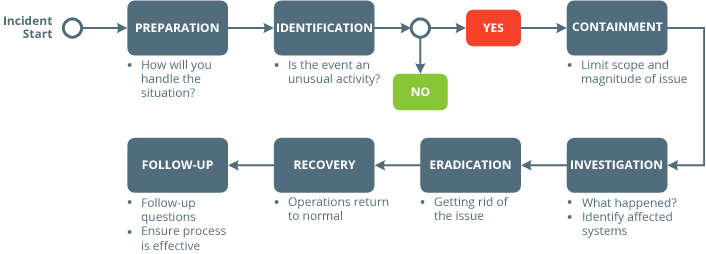Incident Response
Introduction
In the ever connected work of the internet, cyber attacks and data breaches are inevitable. What’s worrying is that in a recent survey, over 50% didn’t consider developing an incident response plan to be a priority (which isn’t a surprise – considering 40% of them didn’t even recognise the risk).
Cyber criminals only need to find one weakness to infiltrate your systems, so it is essential to be prepared when a breach occurs. Article 32 of the GDPR states that organisations are obligated to restore availability of and access to personal data in the event of a physical or technical breach.

Jovasi Technology can help your organisation to develop an incident response plan, assemble its own incident response team, and put measures in place to enable you to detect an attack as soon as possible.

The ability of your organisation to recover in a timely fashion could make the difference between surviving and bankruptcy. It is critical that attacks are detected early, the impact limited, and the recovery started as soon as possible. Our forensic investigators can help you discover what happened, how it happened, and how to prevent it from happening again.
Planning
The basis of an incident response plan consists of:- Identifying your assets (and risks)
- Protecting your assets (and minimising the risk)
- Incident detection
- Responding with an incident response plan
- Recovery and return to normal operations

Jovasi Technology can help your organisation to develop an incident response plan, assemble its own incident response team, and put measures in place to enable you to detect an attack as soon as possible.
Response
With even the best security in place, it is inevitable that a determined attacker will eventually defeat the best security measures. Should your organisation be unfortunate enough to be in this position, then our expert incident responders and forensic investigators can help you when you need it most.
The ability of your organisation to recover in a timely fashion could make the difference between surviving and bankruptcy. It is critical that attacks are detected early, the impact limited, and the recovery started as soon as possible. Our forensic investigators can help you discover what happened, how it happened, and how to prevent it from happening again.
Package
Jovasi Technology’s Incident Response Planning service will provide you with the capability reduce the impact of an incident and restore your services in a timely manner. The service is tailored to your requirements and budget, to make it a very cost effective solution. Planning - Risk assessment and risk management.
Planning - Risk assessment and risk management. Preparation - Responsibilities of those involved in the planning.
Preparation - Responsibilities of those involved in the planning. Detection - Using technology and other procedures.
Detection - Using technology and other procedures. Reporting - How, when, what and to whom they should be reported.
Reporting - How, when, what and to whom they should be reported. Assessment - Incidents, including roles, processes and technologies.
Assessment - Incidents, including roles, processes and technologies. Decision - The decisions to respond to an incident.
Decision - The decisions to respond to an incident. Response - Containment, eradication and resolution.
Response - Containment, eradication and resolution. Lessons Learnt - Review following an incident to highlight improvements.
Lessons Learnt - Review following an incident to highlight improvements.Planning

Incident response plan.
Telephone & e-mail support.
Onsite planning visit.
Incident response testing.
Post incident support (chargable)
From £950 +VAT
In addition to our Incident Response Planning service, we also offer Business Continuity & Disaster Recovery and ISO 22301 services which can help your organisation prepare itself and plan ahead.
Frequently Asked Questions
- Why is it important to have an incident response plan?
Because it will help you understand how to handle cyber security incidents, how to reduce the impact when they occur and help you strengthen your defences against any future incident.
 IT Consultancy
IT Consultancy Project Management
Project Management Data Protection
Data Protection Network Design
Network Design WAN & VPN
WAN & VPN Wi-Fi & Guest Portals
Wi-Fi & Guest Portals Cloud (AWS/Azure)
Cloud (AWS/Azure) Server Infrastructure
Server Infrastructure Active Directory
Active Directory Storage
Storage Backup & DR
Backup & DR 5-Step Cyber Health Check
5-Step Cyber Health Check NCSC Cyber Advisor
NCSC Cyber Advisor Virtual CISO
Virtual CISO Virtual DPO
Virtual DPO Accreditation
Accreditation Secure Architecture
Secure Architecture Vulnerability Scans
Vulnerability Scans Secure Destruction
Secure Destruction Windows Applications
Windows Applications Mobile Apps
Mobile Apps Web Applications
Web Applications Internet of Things
Internet of Things Artificial Intelligence
Artificial Intelligence Data Compliance
Data Compliance Database Design
Database Design Support Home
Support Home News & Blogs
News & Blogs FAQs
FAQs Contact Us
Contact Us Company
Company Quote
Quote



















 Call
Call Contact Us
Contact Us